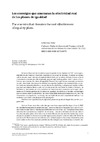Please use this identifier to cite or link to this item:
https://accedacris.ulpgc.es/jspui/handle/10553/72894
| Title: | Los enemigos que amenazan la efectividad real de los planes de igualdad | Other Titles: | The enemies that threaten the real effectivenessof equality plans | Authors: | Grau Pineda, María Del Carmen | UNESCO Clasification: | 5699 Otras especialidades jurídicas (Especificar) 560507 Derecho público 560504 Derecho constitucional |
Keywords: | Igualdad Ley de Igualdad Planes de igualdad Diagnóstico Control y seguimiento, et al |
Issue Date: | 2020 | Journal: | Femeris: Revista Multidisciplinar de Estudios de Género | Abstract: | Hace más de una década que se aprobó la Ley Orgánica 3/2007 para la igualdad efectiva de mujeres y hombres, conocida como la Ley de Igualdad, y parece un tiempo suficiente para hacer balance del grado de efectividad que ha tenido a lo largo de estos años el instrumento concreto por ella impulsado para corregir la desigualdad entre mujeres y hombres en las empresas: los planes de igualdad. Transcurrido este tiempo, se antoja un ejercicio no solo interesante sino necesario analizar sus aspectos jurídicos más controvertidos, aspectos fundamentalmente referidos a sus problemas de efectividad o eficacia real. Análisis crítico que siempre interesa llevar a cabo en aras de poner de manifiesto los éxitos y fracasos, las fortalezas y debilidades, de cara a plantear las modificaciones necesarias para seguir avanzando en el objetivo genético de los planes de igualdad. Son diversos y variados los enemigos que se ciernen sobre su efectividad real pero ha decidido dedicarse la atención a los tres más recurrentes: un diagnóstico incorrecto, una comisión It was more than a decade ago since it was approved the Organic Law 3/2007 for the effective equality of women and men, known as the Law of Equality, and it seems suffi-cient time to take stock of the degree of effectiveness that it has had throughout these years the concrete instrument promoted by her to correct inequality between women and men in business: equality plans. After this time, it seems like an exercise not only interesting but ne-cessary to analyze its most controversial legal aspects, aspects fundamentally referred to its problems of effectiveness or real effectiveness. Critical analysis that always interests to carry out in order to show the successes and failures, the strengths and weaknesses, in order to propose the necessary modifications to continue advancing in the genetic objective of the equality plans. There are diverse and varied enemies that hover over their real effectiveness but has decided to devote attention to the three most recurrent: an incorrect diagnosis, an ineffective monitoring and control commission and appropriate content to achieve the desired goal. |
URI: | https://accedacris.ulpgc.es/handle/10553/72894 | ISSN: | 2530-2442 | DOI: | 10.20318/femeris.2020.5382 | Source: | Femeris: Revista Multidisciplinar de Estudios de Género [ISSN 2530-2442], v. 5 (2), p. 8-32 |
| Appears in Collections: | Artículos |
Page view(s) 5
178
checked on Jan 11, 2026
Download(s)
142
checked on Jan 11, 2026
Google ScholarTM
Check
Altmetric
Share
Export metadata
Items in accedaCRIS are protected by copyright, with all rights reserved, unless otherwise indicated.
